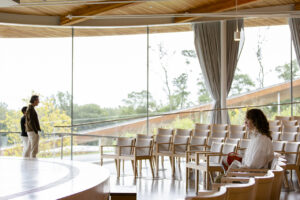Topics
President’s Perspective is a blog by Grace Farms Foundation’s Chair & President, Sharon Prince.

Sharon Prince in the Pavilion of the River building © Ryan Slack
I have seen that hopeful spaces matter. In looking back over last year’s milestones, I am reminded how powerful hopeful spaces can be – how they can communicate and how they can advance good in the world.
The porous design of Grace Farms and the River building was meant to inspire and break down barriers between people. Natural light flows through more than 200 floor-to-ceiling glass panels in the SANAA-designed River building, generating 360-degree views of rolling vistas of seasonal landscape. The undulating pathways under a curvilinear roof follows the flow and elevation of the landscape. And along this path, technology is often left in your pocket, and you might notice a red-tailed hawk fly overhead on your way to the Library or the Pavilion for tea.
This open architecture, embedded into an 80-acre expanse, and the pathways that extend out to a faraway Cattail Pond, cue discovery. Meanwhile, nature—the 10 different restored native habitats, meadows, roaming pollinators, 80+ sighted birds—can inspire a sense of awe. This intentional relationship between indoors and outdoors, complemented by our intention to cultivate a peaceful, welcoming environment for all, can stimulate new perspectives.
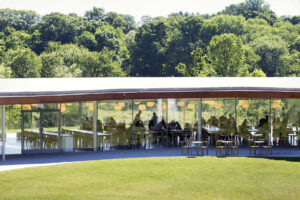
Grace Farms Commons © Dean Kaufman
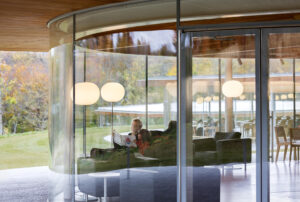
Grace Farms Library, with views of the layered glass-enclosed volumes of the River building © Dean Kaufman
A restorative, hopeful quality manifests when we interweave our initiatives into this living and breathing space. When we convene human rights advocates, acclaimed artists, interfaith leaders, not-for-profit groups, government agencies, and the general public, the impossible suddenly seems possible. It is our hope that this unique and porous setting encourages those who visit the site to slow down the pace of their daily routines, to reflect and appreciate their surroundings, and to engage in unexpected conversations that enable new ideas and perspectives.
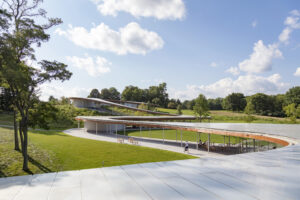
Anodized aluminum panels reflect the sky and surrounding nature © Sahar Coston-Hardy
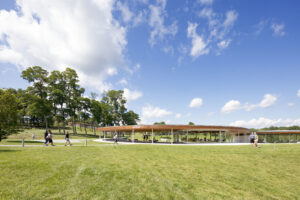
Grace Farms is free and open to the public six days a week © Sahar Coston-Hardy
While I believe that space can be inspirational and communicate, space alone can’t drive change. It takes people who can envision what can be, who can make a commitment, and then vigorously work to accomplish it.
We have built an accomplished team of visionaries in their respective fields of nature, arts, justice, community, and faith. Together, they have helped create a distinctive, boundary-defying culture of grace, peace, and excellence. Collaboration occurs across disciplines, and in ways not common among many institutions. We are uniquely positioned to offer an encounter with the arts, examining empathy, awe, silence and joy, while sharing the same space with expert Federal law enforcement working on disrupting contemporary slavery and wildlife trafficking.
Interdisciplinary Collaborations
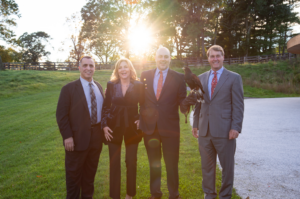
Left to Right: Rod Khattabi, Sharon Prince, Mark Fowler, Richard Wiese, Emmy award-winning producer and President of The Explorer’s Club © Julien Jarry
Our distinct interdisciplinary approach in addressing complex and difficult matters can accelerate action and progress. For example, our Justice and Nature initiatives built an effective wildlife protection model for combating wildlife trafficking and transnational organized crime. Many of the same international crime syndicates included in human trafficking are also involved in illegal wildlife trade. Combining the conservation expertise of former Nature Initiative Director Mark Fowler and our highly credentialed Director of Law Enforcement Rod Khattabi, is unique in the NGO world. Last year, we participated in multiple international wildlife crime trainings and partnered with several law enforcement task forces, including the Lusaka Agreement Task Force, and the countries of Tanzania and Mozambique. We were able to lend our expertise and facilitate collaboration between law enforcement and NGOs to promote a new model, which is disrupting organized wildlife crime syndicates operating in Africa and Asia.
These partnerships and collaborations have contributed to dismantling two wildlife trafficking syndicates operating out of Central Africa, leading to arrests of more than 20 wildlife traffickers and corrupt government officials, as well as the seizure of three tons of ivory in South East Asia.
These types of collaborations lead to hopeful progress, particularly when the matter at hand is painful and troubling – as it is when our Justice Initiative confronts the reality of human trafficking, even right here in our own backyard. It’s challenging to confront and disrupt human trafficking, the second largest global criminal network. But once you know, you cannot un-know it. We firmly believe it’s imperative for all of us to use our wherewithal to ensure freedom for all, which requires our team to be fearless and to link arm-and-arm with our partners to make change.
Systemic Change
This iterative step-by-step work never seems to happen fast enough. But we are making process. Our programs have become a catalyst for global systemic change in some of the most pressing and ignored humanitarian issues of our time. With more than 40 million victims worldwide, slavery is the second largest global criminal industry and often remains an unseen reality along global supply chains. Led by Krishna Patel, former Justice Initiative Director, and Rod Khattabi, they trained 1,700 foreign law enforcement and other stakeholders in countries including Republic of Congo, Haiti, Tanzania, and Thailand, as well as law enforcement and government officials in Connecticut and New York.
We know that people working collaboratively across sectors is the reason change happens. Backpage.com, which profited by facilitating human trafficking, including children, through its advertisements, no longer exists. We advocated for the criminal prosecution of Backpage.com and its executives, which was the largest online sex-trafficking platform. A federal grand jury in Arizona indicted Backpage.com and its executives on April 9, 2018.

Panel entitled “Freedom Fighters | The Battle against Modern Slavery” leading to advocacy to shut down Backpage.com. Left to right: Krishna Patel, Senator Chris Murphy, Nacole S., Vincent Nappo © Vanessa Van Ryzin
Our public programming, with Senator Chris Murphy and attorney Vincent Nappo, raised awareness about the criminal and civil violations by on-line platforms that facilitate sex trafficking by knowingly advertising children. Building public awareness was also part of our campaign to advocate for the support of the passage of an amendment to the federal Communications Decency Act (CDA), which was successfully passed on April 11, 2018, to permit survivors to file civil claims against website publishers that knowingly publish advertisements selling trafficked minors.
We live in a world where there must be a universal commitment to act against destructive forces that encourage division, hate, and slavery. So, we are working towards building an ethical and transparent supply chain with the country of Georgia. Grace Farms Foundation entered into an important collaboration with the country of Georgia to support its commitment to transform its economy to include a regulatory model that will support ethical and transparent supply chains in its commercial sector.
As many of you know, our second annual benefit was dedicated to a global media campaign called designforfreedom.org. Two agencies of the media company WPP unveiled our nascent concept for Unchain, now its own public charity, with its own board. Because of your support we had a wonderful financial start to doing what our world desperately needs – a focused and comprehensive awareness-building platform. We will continue to work together and support Unchain in every way and we hope you will join us.
New Works
These intersections allow for new outcomes that are elemental to our work. In 2018, it was wonderful to receive the Governor’s Patron of the Arts Award with recognition that the River building was the first expression of art. Hundreds of artists, who participated in our programs and collaborations, are now a part of Grace Farms’ story. Among the visual, literary and performing arts who have incubated new works and generated new perspectives, choreographers Andrea Miller of Gallim Dance, Silas Farley of the New York City Ballet, award-winning poets Kevin Young and Ilya Kaminsky, visual artist Julianne Swartz, and the pre-eminent Meredith Monk, have gone on to receive notable industry recognitions. Meredith Monk’s February workshop and performance to finish Cellular Songs was an honor, before being presented at BAM (Brooklyn Academy of Music).
In a time where government resources for not-for-profits are dwindling, more than 100 government and not-for-profit organizations have benefited from our grants of working space and intersectional roundtables. The Space Grants and roundtables serve as a forum for people to hear from experts, ask questions about the challenges they face, and discuss practical steps toward building positive change within their communities.
Dialogue
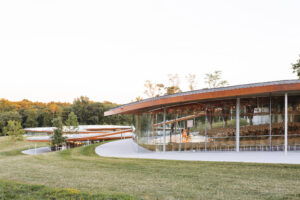
An inside view on religion in the media, conversation in the Sanctuary with Wajahat Ali and Michelle Boorstein © Niv Rozenberg
Opening up dialogue across faiths in our pluralistic society is paramount to creating grace and peace in the world. With Michelle Boorstein from The Washington Post and Wajahat Ali, a contributor to CNN and The New York Times, we created a discussion this past summer about how faith is portrayed in the media. Insights were shared from their extensive writing and speaking about faith in America. Bringing this type of civil discourse to the public can hopefully help us expand our capacity for greater compassion in our society.
Hopeful Spaces Matter
The velocity to advance good can be accelerated by a hopeful, restorative place. Our team substantively works to create a place where a nexus of people and organizations can together undertake complex problems in a democratic and civil manner. The porous nature of the River building combined with building a diverse team across our five initiatives activates a space – the power comes when the two are united. As a result, all five of our initiatives–nature, arts, justice, community, and faith—are flourishing.
I’m reminded of visual artist Julianne Swartz’s temporary installation Joy, still., which recently ended at Grace Farms. Our space helped inform her work and give us multifaceted aspects of joy. “And joy is not always talking about joy, but it is also talking about sorrow and despair, so we will know what joy is,” she says.
This is why hopeful spaces matter – so we can advance good in the world even when confronted by the most daunting and horrific humanitarian crimes. This allows us as an organization to steadily work together in the pursuit of eradicating contemporary slavery and gender-based violence, generating outcomes that could solve some of the world’s most pressing problems. At the same time, we can still experience joy.
So, I invite those of you to support our work using your wherewithal and for those who have not visited Grace Farms to come and take a River Walk and join us in this hopeful, inclusive space where restorative work flourishes; hopeful spaces matter.
Grace and peace to you,
Sign up for our newsletter to learn more about Grace Farms’ ongoing programing and our initiatives: nature, arts, justice, community, and faith.

